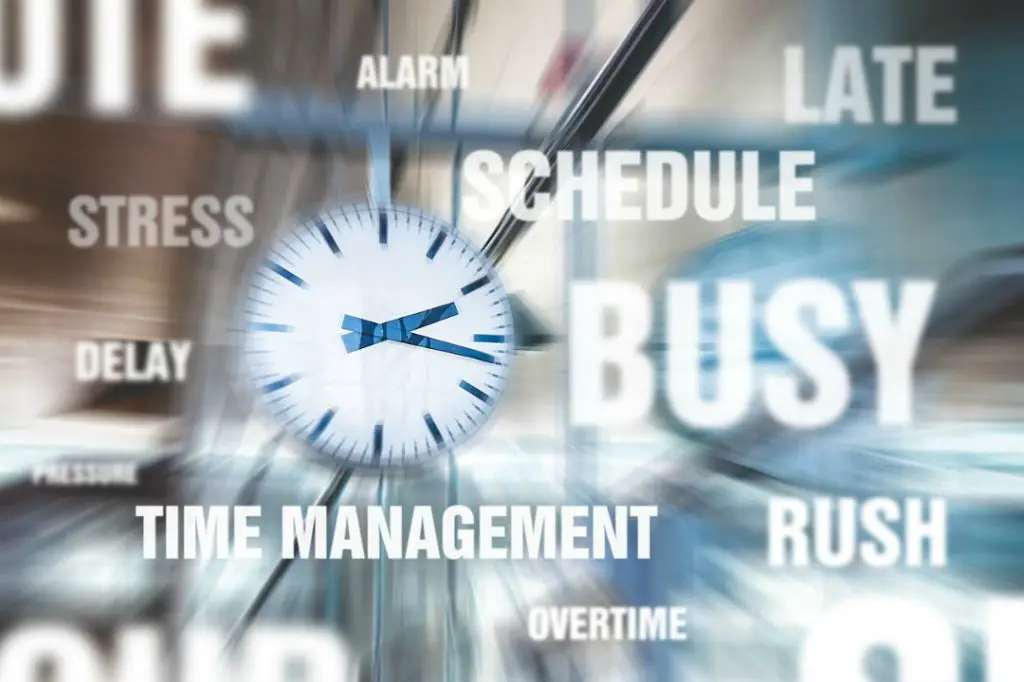There are several easy ways to improve your time management skills. Sometimes it is hard to believe that everyone is working off of the same 24 hours each day. While some of us seem to struggle through the day, others glide right through it. Of course, how hard you work will contribute to your level of productivity, but most of the time it will come down to how efficiently you use your time.
As digital nomads, it’s essential that we efficiently use our time. After all, when we’re not exploring the world, planning routes, or getting from point A to point B, we still have work to do. Many followers have asked us how we’re able to manage all of these moving parts and still make time to enjoy travel. Here’s the secret, we go out of our way to make sure we’re not wasting time.
“Here’s the secret, we go out of our way to make sure we’re not wasting time.”
How to Improve Your Time Management
Much of improving time management comes down to eliminating activities that do not add value to your life, while also creating a routine and finding balance. How much effort you put into your workday is only one piece of the puzzle.

If you feel like you would benefit from being more productive and organized then learning more about the 15 ways to improve your time management skills is for you. These helpful suggestions will help you to manage your time and add structure to your days. You will be amazed at how making just a few minor changes to your day will have a positive impact on your life.
15 Tips to Improve Your Time Management Skills and Strategies
1. Audit Your Time to Find out Where You Are Wasting It
Begin by figuring out how you spend your time. In many circumstances, there is a disparity between how you think you are spending your time and how you are actually spending it. You can track your time in an excel spreadsheet or by using a time management app that will track the time you have spent on your phone. Take at least one week to account for your activities. Afterward, take this data and analyze it to determine opportunities for improvement.

For example, many people these days are finding themselves spending a significant amount of time on phone calls, texting, or social media, In many cases, these activities are adding little value to an efficient life. Naturally reducing the time spent doing one or all of these activities will increase productivity elsewhere.
2. Use a Calendar to Manage Daily Activities
Use a digital or handwritten calendar to manage and take responsibility for your daily activities. This tip is one of the easiest ways to efficiently manage your schedule. Calendars can be used to track just about every daily activity including meeting times and locations, scheduled events, deadlines, and blocking out time for personal work. For example, Microsoft Outlook will allow you to block out time on your public calendar so that coworkers are proactively informed that your time is being allocated elsewhere.
3. Spend More Time on Real Work and Less on Busywork
So many of us spend our time doing busy work that we oftentimes confuse it with ‘real’ actual work. Busy work includes activities like obsessively checking email, organizing files, cleaning your workspace, checking social media, and reading books about the tasks that you should complete, instead of actually doing them.

Busy work may feel like you are being productive, but you are not. Sure, many of these tasks need to be done, just not countless times throughout the day. For example, instead of checking email once every 15-minutes, simply set aside half an hour in the morning and another in the afternoon. Therefore, instead of checking email 30 times per day, you will only be checking it twice per day.
4. Learn to Delegate and/or Outsource
For many people, delegating or outsourcing tasks is difficult. This is mainly because the owner of the task will often time lose some control of the final output and the end product may suffer. However, delegating and outsourcing some tasks will free up time for you to work on more pressing matters.
If you have not done this before, begin with tasks that are considered insignificant or easy. For example, if you spend 30-minutes per day filing paperwork then this may be an easy task that you can delegate to a lower-level employee.
5. Proactively Get Work Done Ahead of Schedule
When many of us are given a deadline, we will aim to simply meet the deadline. Instead, try to proactively get the work done ahead of schedule. If you mentally set an earlier date for the deadline, then you’re now more likely to get it done early. This will free up time for you to double-check your work or give you the freedom to focus on other tasks.
6. Determine the Time of Day That You Are the Most Productive
All of us have an internal clock that guides us throughout the day. Naturally, it will tell you when to eat, sleep or be productive. For example, some people may be the most effective during the morning, while others may find they work better at night. To effectively manage your time, you need to determine the time of day that you are the most productive and plan your life around it.

For example, you should take all of your high-priority tasks and try to complete them during your peak working time. Performing these tasks during your most productive time of the day will increase your confidence and allow you to get more done in less time. This simple technique will help you in completing your work on time.
7. Develop a Routine That Works for You
Developing a weekly or workweek routine will allow you to track how you spend your time and it will create an environment to boost your productivity. By developing a routine, you will instinctively complete your tasks rather than squandering time away.
For example, many people find their mornings to be the most productive part of the day. If you’re spending a majority of your mornings mindlessly surfing the internet, then perhaps you should create a routine of only surfing the internet from 7 to 8 p.m. Make sure all of your deliverables have been completed before doing so.
8. Use Reminders to Stay on Task
Your calendar and to-do list may be extremely detailed, but that does not mean things will actually get done. You’re likely to miss deadlines if you don’t have an easy way to remind yourself of what needs to get done. For example, if you find yourself still missing deadlines after you’ve recorded them on a calendar, then perhaps you should begin using either a phone app or sticky notes to provide yourself with a reminder.
9. Instead of Multi-Tasking Try to Get One Thing Done at a Time
Many people who try to multitask end up getting fewer things done, mainly because they find themselves getting distracted. It is harder to focus and put your maximum effort into a task if you’re not fully engaged or constantly shifting between work. Not only will you be wasting your time but you’ll also see a decrease in your productivity.

Instead of attempting to work on more tasks at once, try to complete the most important one first. For example, you should focus on completing a high-value task and complete it based on its priority. High-value work consists of tasks that help you to achieve your goals, values, and long-term mission.
10. Plan Your Week on Sunday
It is essential to take some time on Sunday to plan out your week. This is a good way to figure out what your high-value tasks are and to determine how you’ll accomplish and prioritize them. Starting the week off with a plan is the best way to improve your time management skills.
For example, sometime on Sunday, figure out what needs to be done in the coming week and prioritize the tasks by their deadline and importance. If the item(s) have not been added to your calendar, make sure to do so. Another good option is to take the last 15-minutes of work on Friday to address what needs to be done the following week. You can even leave yourself a reminder so you know where to begin!
11. Complete Your Most Demanding and Important Tasks in the Morning
Many of us tend to procrastinate, especially when we have to do something we don’t necessarily want to do. By completing your most demanding and important tasks first thing in the morning, you’ll free up time for other things, and you’ll increase your confidence.

Creating a routine of completing tasks in the morning will get easier with time. Our brains are still booting up in the morning, making it easier to focus on individual tasks. For example, if there’s a task that you don’t want to do, but you need to do it, then you should try and complete it first thing in the morning.
12. Research the Best Ways to Organize Your Email
People with an unorganized email system tend to spend a greater amount of time ‘working on emails.’ The best way to decrease the amount of time spent on emails is to organize your email system. If you don’t know how to organize your email system, it’s worth doing some research to find the best techniques. You can also ask some of your colleagues how they organize their email systems to get some ideas.
Some of the best ways to organize your email are by using some of the standard features that are inherited in most systems. For example, you may try using features like archives, actionable labels, filters, or templates to streamline the process.
13. Don’t Waste Time on Low-Value Tasks or Doing Nothing
When you feel overwhelmed because you’re missing deadlines or have a lot of tasks to complete, the last thing you should do is nothing. From countless meetings to commuting to work, it’s nearly impossible to feel like you’re not wasting time during the day. However, technology makes it easier than ever to stay connected and work on high-value tasks.

However, if you find yourself in the predicament of working on low-value tasks. Or, if you’re doing nothing but it’s out of your control, then something needs to change.
For example, if you’re getting invited to a recurring meeting but tend to offer no output. Or, if you’re not getting anything out of the meeting, it may be a good time to speak with the organizer to determine if your attendance is required.
14. Create a Healthy Sleep Schedule
Most people will need about eight hours of sleep per night. People that don’t get enough sleep oftentimes become distracted and procrastinate throughout the day. Determine how many hours it takes you to feel recharged and create a healthy sleep schedule around it. For example, if you calculate that you need nine hours of sleep each night and you need to wake up at 7 a.m., then you should plan on being in bed by about 10 p.m. Creating a healthy sleep schedule will allow you to achieve your daily goals with an increased sense of energy.
15. Don’t Forget to Include Exercise Into Your Schedule

It’s no secret that exercising regularly can help to decrease stress and anxiety. Many of us do not see the correlation between exercise and time management. However, exercise provides control and balance over your mental capacity, promoting increased focus. Also, exercise increases overall energy levels, boosting your ability to effectively manage your time. For example, even a small amount of exercise such as dancing, walking, or yoga can boost endorphin levels. As a result, this will help to relieve stress and increase happiness.
Do you have any questions or comments regarding improving your time management? Please let us know in the comments section below.
We Need Your Help
Did you find this article helpful? If so, bookmark it and when you’re planning your next vacation, click on any of the links below before finalizing reservations. You’ll get the best price, we’ll earn a small commission, and you’ll help support future articles.
Thank you!
BEST TRAVEL SEARCH ENGINES
🏘️ Book Accommodation
We use Tripadvisor to compare prices and reviews in advance and check availability
✈️ Book Your Flight
To find the cheapest flight options, use Skyscanner to find the most suitable choice for you
🚗 Reserve Rental Car
Use Discover Cars to compare prices and view the largest selection of vehicles




